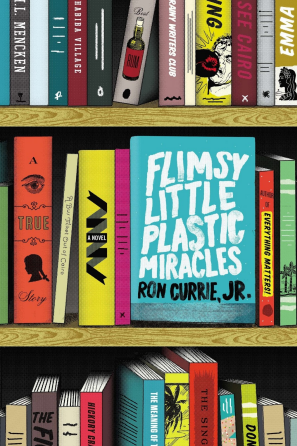By Dessa Bayrock (The Cascade) – Email
Print Edition: July 3, 2013
 The real head-scratching question at the core of this novel is just how much of it you should believe.
The real head-scratching question at the core of this novel is just how much of it you should believe.
Ron Currie Jr. is not just the author, but the centre of the story: a hapless narrator, self-deprecating protagonist and barely-successful novelist. As artists are wont to do, he finds himself sequestered on a tropical island with only his emotions and alcoholism for company while the woman he loves—the woman he wrote his first novel about—decides whether she loves him back.
So far, the two Ron Currie Juniors match up pretty well, and even more so if you’ve read Currie’s other book—Everything Matters!—which fits suspiciously well into the description of the unnamed first novel.
When I finished the book, I found myself still unsure what I should believe. The cover’s claim of a true story? Dewey decimal’s clear categorization of fiction? Maybe Currie’s note on the inside cover that the contents were both true and heavily fictionalized.
This dilemma spawned even more questions: how true does a true story have to be? How heavily can an author draw on reality and still call it a fiction?
Unlike the narrator of the novel, however, my brief real-world research turned up no mention of the real Ron Currie Jr. (as the main character in the novel does)accidentally faking his death and launching his unpublished novel into best-sellerdom – a conceited detail, if an irresistible inclusion on the part of the author.
All in all, I found the book to be a little less cohesive than Everything Matters! (which, as a side note, is pretty damn brilliant and highly recommended from this corner). Then again, its wandering nature and vaguely moral core are reflective of real life – in trying to adapt a life to a novel, Currie hit the mark. Real life doesn’t usually have a clear outcome, a fact that many novels outright ignore in favour of a neatly-packaged conclusion.
Even when the book springs into fantasy, and simulacrum Currie finds himself washing dishes in a middle-eastern desert village to pay the bills, his journey mimics a real-life journey. He doesn’t know what he wants. He doesn’t know what his plans are. But why be bothered about it? Unlike so many narrators and so many protagonists, Currie is content to sit and revel in the status quo.
When his fate eventually forces him back into North American culture and owning up to still being alive, he shirks. This is not a brave little hobbit, nor a clever genius hacker, nor a capable and ingenious young person looking for adventure. This is a normal person. He’s tired. He’s a little sick of his old life. Who can’t relate to that sentiment?
It’s nice, for once, to have a perfectly normal narrator – and whether or not it’s a work of reality or pure fiction, it’s enough to remind the reader that every life is a little bit adventurous if you frame it the right way. It also stands as a reminder that adventure doesn’t have to be glamorous, and sometimes an existence filled primarily with washing dishes and worrying if a person loves you back is a good one.
As Currie notes, we live in an age where even a nicotine patch is kind of miracle in the right light – even if it is flimsy and made of plastic.


